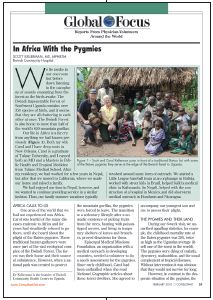- Clinical Technology
- Adult Immunization
- Hepatology
- Pediatric Immunization
- Screening
- Psychiatry
- Allergy
- Women's Health
- Cardiology
- Pediatrics
- Dermatology
- Endocrinology
- Pain Management
- Gastroenterology
- Infectious Disease
- Obesity Medicine
- Rheumatology
- Nephrology
- Neurology
- Pulmonology
Global Focus: Reports From Physician-Volunteers Around the World
As a screener and admissions committee member at our medical school (University of California School of Medicine at Davis), I am privileged to review the personal statements of many, many applicants who want to be doctors in spite of the recent hard times in our country that have led more than a few American physicians to believe that our profession is less valued and less desirable as a life work than it has been in the past.
As a screener and admissions committee member at our medical school (University of California School of Medicine at Davis), I am privileged to review the personal statements of many, many applicants who want to be doctors in spite of the recent hard times in our country that have led more than a few American physicians to believe that our profession is less valued and less desirable as a life work than it has been in the past. These applicants have often been advised-even by other doctors-not to go into medicine. They have been told that they will no longer have the high respect accorded former generations of physicians, that they will be creatures of "the system" instead of its masters, that they will be separated by their work from their families and friends, that they will labor more and more for less and less remuneration-and that they will go increasingly into debt to be allowed to do all this. Yet still they apply by the thousands.

Some young men and women are propelled to apply because of the excitement of discovery in science; others have a specific dedication to a subspecialty born of their own experience with illness in a family member or themselves. However, for an increasing number of applicants, it is global medicine that appeals to them: a combination of adventure and much-needed service to the millions who suffer in the developing world (as well as in the places in our own country tormented by poverty and hardship)-service to people to whom they know they could bring comfort. It is a wonderful, vocational generation now entering our profession, and the doctors currently serving around the globe are their heroes.
CONSULTANT's new series, Global Focus, will bring you the first-person stories of some of these physicians. This month, for example, Dr Scott Kellerman tells of his and his wife's service to the Batwa pygmies of southwestern Uganda (page 51). Dr Kellerman writes of battling malaria and HIV infection, of hanging intravenous quinine solutions from tree branches and performing surgery on mats laid on the forest floor. During his first stay with the pygmies, he found their needs "so compelling" that he and his wife decided to return to Uganda for an extended period. With stories such as Dr Kellerman's, this new series will, I believe, serve not only to inform but also to inspire all physicians, both young and old. The experiences of the doctors whom Global Focus plans to showcase will give testimony to the lasting fulfillment brought by commitment to the most deeply felt core values of a noble profession-not wealth, not social status, not control-but service to the suffering who need us.
